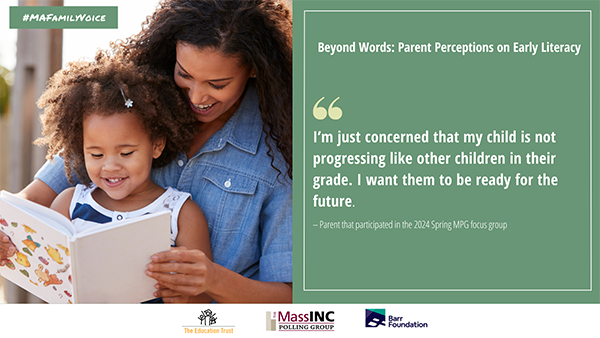Massachusetts Parents Concerned About Reading Approaches, Want Focus on Proven Methods
In response to the literary crisis, parents want evidence-based reading instruction in schools.

CONTACT:
Chanthy Lopes
Clopestoro@edtrust.org
(401) 497-4458
In response to the literary crisis, parents want evidence-based reading instruction in schools
BOSTON—About 8 out of 10 (84%) parents believe Massachusetts schools should be required to use evidence-based reading curricula. This call to action comes amid alarm bells sounding off in recent months about the troubling state of literacy across the Commonwealth. A new poll released today by EdTrust in Massachusetts sheds light on parental concerns and perspectives on the essential measures, resources, and supports necessary to address the decline in reading proficiency. These poll results will be highlighted at a virtual event on Tuesday, May 14, at 10 a.m. (details below).
“The sobering reality that a majority of Massachusetts children are going to school without learning basic literacy skills is deeply troubling, but also completely preventable,” said Jennie Williamson, state director for EdTrust in Massachusetts. “The widespread use of reading approaches that have been proven ineffective and even harmful to students in schools across the state must be confronted, urgently and head-on by state and local policymakers.”
The statewide poll, conducted by The MassINC Polling Group, reveals that 31% of parents are concerned about their child’s reading progress — with heightened concerns amongst Black (36%), Latino (38%), and Asian parents (37%), those from low-income backgrounds (37%), and parents from Gateway cities (38%) — but these feelings are especially prevalent among parents of English learners (63%) and parents of children with an individualized education program (IEP) (50%). Additionally, these same groups of parents who express heightened concern are more likely to seek outside help to support their child’s reading development. Upon learning that only 44% of third graders are meeting literacy proficiency expectations on the Massachusetts Comprehensive Assessment System (MCAS), 79% of parents expressed concerns about students’ overall reading levels.
“These poll findings highlight the importance of transparency, effective communication, and collaboration between schools and families,” said Keri Rodrigues, founding president of the National Parents Union and mom-in-chief of Massachusetts Parents United (MPU). “As policymakers plan their next steps, they must recognize that while adopting innovative policies and making significant investments are necessary, they alone won’t solve the literacy crisis. We also need a comprehensive strategy that ensures districts are empowering parents with crucial information, including their child’s academic progress and areas requiring additional support, and working to center family voice and perspective in the decision-making process.”
Other key poll findings include:
These poll results will be highlighted at a virtual event on Tuesday, May 14, at 10 a.m. featuring special remarks by Senator Sal DiDomenico and Mike Moriarty, followed by a panel discussion moderated by Mandy McLaren of The Boston Globe, with a diverse array of experts, policymakers, practitioners, and field leaders on policy solutions to address the literacy crisis in Massachusetts. Registration is free, and the event is open to the public.
“Educators across the state know firsthand that the literacy crisis is not limited to reading proficiency alone. It concerns the opportunities that reading can open up,” said Lisa Lazare, Executive Director of Educators for Excellence in Massachusetts. “When children excel in reading, their academic journey is set on a firm foundation, paving the way for broader success in school and their future aspirations.”
METHODOLOGY: This poll is the latest in a series of 10 waves of polling going back to mid-2020, made possible by support from The Barr Foundation. 1,559 Massachusetts parents with students in grades K-12, including oversamples of Black, Latino, and Asian parents, were polled (live telephone and online interviews) in English and Spanish from April 8-May 2, 2024. Results within race and ethnicity were weighted to age, gender, geography, and education level for each group. The results were weighted with a credibility interval of +/- 3.0 percentage points.
###
About EdTrust: EdTrust is committed to advancing policies and practices to dismantle the racial and economic barriers embedded in the American education system. Through our research and advocacy, Ed Trust improves equity in education from preschool through college, engages diverse communities dedicated to education equity and justice, and increases political and public will to build an education system where students will thrive.
About The MassINC Polling Group: The MassINC Polling Group (MPG) is a nonpartisan public opinion research firm serving public, private, and social-sector clients. MPG elevates the public’s voice with cutting-edge methods and rigorous analysis. Based in Boston, MPG serves a nationwide client base. Learn more at massincpolling.com.